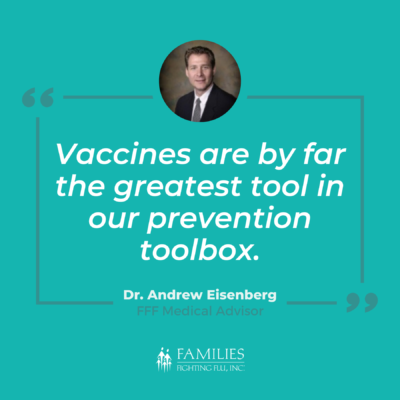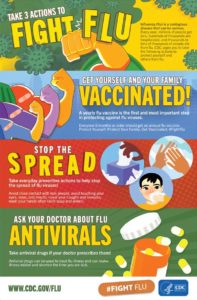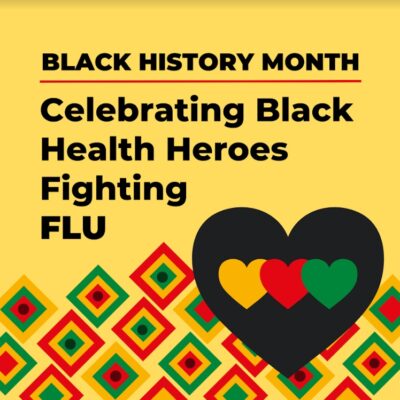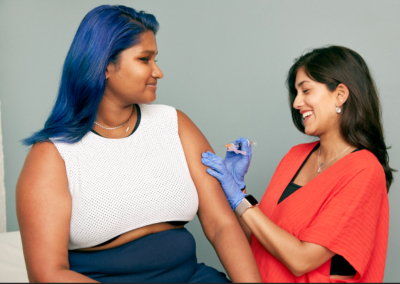- Expert Commentary
InFLUencer Dr. Eisenberg Highlights the Best Tool in Our Prevention Toolbox

Dr. Andrew C. Eisenberg is a Families Fighting Flu medical advisor and a Board Certified Family Physician with years of emergency department experience. He currently serves as the liaison from the American Academy of Family Physicians (AAFP) to the American Academy of Pediatrics (AAP) Committee on Pediatric Emergency Medicine.
As a family physician, I have spent my career working to prevent illness and disability and keep people and their families and communities well. I work towards a future where no one needs to be hospitalized due to the flu or other vaccine preventable illnesses. I believe in this future because we have tools to prevent and lessen the effects of the flu, and vaccines are by far the greatest tool in our prevention toolbox. Infectious diseases were the number one killers of people up until just the last century when brilliant scientists and technology helped develop immunization techniques. More lives were saved and illnesses prevented by vaccinations than by any other health intervention besides clean water.
People often assume that the flu is only a mild respiratory illness, but this just isn’t true. Having influenza can worsen diabetes, stress the heart, leading to heart failure and heart attacks, increase the risk of stroke and overwhelm the immune system, leading to many major health calamities.
 I recently presented a webinar with my fellow Families Fighting Flu medical advisor Dr. Jeb Teichman titled, “Influenza: Acting Beyond Treatment to Protect Everyone.” In the webinar, we highlight the CDC’s Take 3 approach to fighting the flu: #1 – Get vaccinated annually; #2 – Stop the spread; and #3 – Take antiviral medications if prescribed.
I recently presented a webinar with my fellow Families Fighting Flu medical advisor Dr. Jeb Teichman titled, “Influenza: Acting Beyond Treatment to Protect Everyone.” In the webinar, we highlight the CDC’s Take 3 approach to fighting the flu: #1 – Get vaccinated annually; #2 – Stop the spread; and #3 – Take antiviral medications if prescribed.
It’s best to receive your annual flu vaccine by the end of October, but vaccination even earlier or later in the season is beneficial, especially if it’s before flu starts circulating in your community. We’ve all seen with COVID-19 how things like handwashing, social distancing, mask wearing and staying home if you are sick can help stop the spread. This has likewise helped shut flu down this year as well.
But if you do get sick with the flu, it’s important to contact your healthcare provider immediately and ask about treatment or prevention with antivirals. Antivirals can speed your recovery, and prevent spread of infection to others. They are another important tool in our flu prevention toolbox. If you have the flu, other members of your household can take antiviral medication prophylactically – or before they are sick – to stop the flu before it starts.
Let’s work together and do our part to prevent the flu and protect our families. Get vaccinated. Stop the spread. Ask your doctor about flu antivirals for you and members of your household if you do get the flu.


